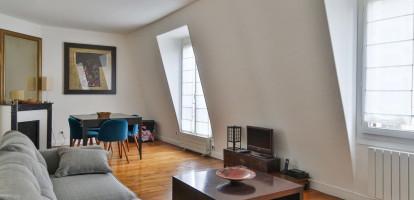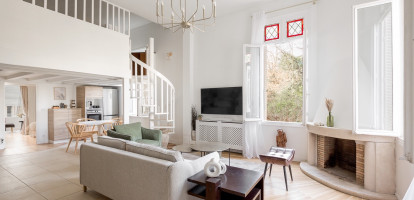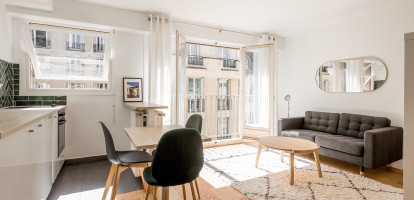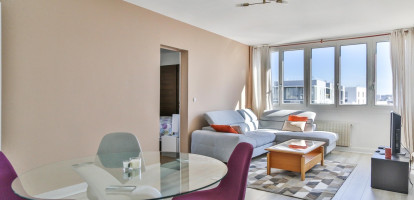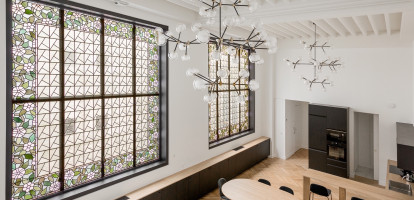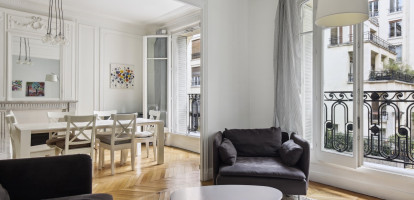French non-occupant landlord insurance, PNO, is crucial for expatriates owning real estate in Paris. It provides vital protection against rental risks, property damage, liability, and loss of rental income. This blog guides you through its coverage, price, subscription process, etc.
What is PNO insurance (non-occupant owner insurance)?
PNO insurance (for Propriétaire Non-Occupant), or landlord insurance, is designed to protect property owners while not occupying the property themselves. It is commonly used by landlords who rent out their properties to tenants.
The coverage of PNO insurance:
Basic PNO Insurance Coverage
The non-occupant owner of a condominium unit must subscribe to liability insurance. This insurance contains specific basic coverage:
- Liability Insurance: covers the owner when their property causes damage to a neighbor's property, to the common areas of a building, or causes harm to a third party in the absence of a tenant or when their insurance does not cover the claim.
- Comprehensive Coverage: covers fire, water damage, theft and vandalism, glass breakage, storm and weather events, natural disasters, and technological disasters.
Additional PNO Insurance Coverage
In addition to these basic coverages, other additional coverages exist for non-occupant owner insurance:
- Loss of Enjoyment (troubles de jouissance): This coverage ensures the owner's liability towards their tenant in case of lack of maintenance or construction defects in the property itself.
- Construction defects: For instance, if the electrical socket is not working correctly, your property could become unsafe (or even uninhabitable).
- Neighbors and Third Parties' Claims: This coverage protects the landlord in case of damage originating from the property and affecting a neighbor's or third party's property.
- Rental Income Loss: This coverage ensures the owner against unpaid rent and delays in paying rent and rental charges by their tenant.
Non-occupant homeowner (PNO) insurance coverage scenarios:
Non-occupant landlord insurance (PNO) covers you in the following situations:
- If your tenant is responsible for damage, you wonder if the tenant's insurance will adequately cover your rental property (especially if the tenant has taken out insurance with minimal coverage).
- If your tenant is the victim of a damage claim for which they are not responsible, the owner's insurance, and not the tenant's, comes into play. For example, when frost bursts a pipe inside a rented dwelling, the landlord's PNO insurance will cover the claim since the damage was not caused by the tenant.
Real-life Scenario of use of Non-occupant landlord insurance:
Marie owns an apartment in Paris, which she rents out long-term to a tenant who plans to stay for several years. To protect her investment, Marie decides to purchase non-occupant landlord insurance.
Example:
During heavy rainfall, the roof of Marie's apartment building develops a leak, causing water to seep into her apartment. The water damage affects the ceiling, walls, and flooring in the living room and one of the bedrooms.
How PNO Insurance Helps:
- Property Damage Coverage: Marie's landlord insurance policy covers repairing or replacing her apartment's damaged ceiling, walls, and flooring. It also covers any personal property she provides for the tenant's use, such as furniture and electronic appliances.
- Covering Loss of Rental Income: Marie lost rental income during the repair period since the apartment was temporarily uninhabitable due to water damage. Her non-occupant landlord insurance policy includes coverage for loss of rental income, reimbursing her for the rent she would have earned from renting out the property during this time.
- Liability Protection: If the water damage in the apartment downstairs causes injury to the tenant or damages the apartment, Marie's insurance policy provides liability coverage for medical expenses and compensation for damages if she is found liable.
- Legal Expenses Coverage: If Marie needs to pursue legal action against the building management (syndic) or contractors responsible for the roof maintenance, her non-occupant owner insurance policy may cover the associated legal expenses, including lawyer and court costs.
Distinction from Other Types of Property Insurance in France:
Owner-occupier insurance: this insurance covers the situation where the owner occupies the property they own;
Habitation Insurance (Assurance Habitation—MHR): Tenants typically purchase multi-risk home insurance to protect their belongings and provide liability coverage. It also covers significant rental risks (fire, explosion, water damage, etc.). However, home insurance does not cover the structure of the building or the landlord's interests.
Why take out a non-occupant owner's insurance policy in France?
The importance of PNO insurance during tenants' absences and vacancies
The importance of non-occupant owner insurance is particularly notable in the following cases:
- Extended Absence of the Owner: If the owner is temporarily absent from the property due to travel, business trips, or other reasons, PNO insurance ensures continuous protection against property-related risks, even in their absence.
- Between Tenancies: When the property is vacant between tenancies, it remains exposed to risks such as vandalism, theft, or weather-related damages. Non-occupant landlord insurance offers vital coverage to protect the owner's investment during these vacancy periods.
The Benefits of PNO Insurance for a Rented Property
Do you own a property you rented out? Non-occupant owner insurance is helpful in the two following scenarios:
- Your tenant is insured as required by law yet uncovered for the loss just suffered. Then, the landlord's insurance steps in to provide compensation.
- Your tenant must still fulfill their legal obligation to get housing insurance, but your non-occupant landlord insurance covers the repairs.
PNO Insurance for an Unoccupied Property (Vacant in between two rentals, for example)
Vacant housing does not benefit from a tenant's home insurance. Therefore, the property owner is solely responsible in case of an accident. With no non-occupant landlord insurance, they are responsible for all damages and repair costs.
For instance, if a water leak from your bathroom pipes damages the neighbor's apartment below, you must fund the cost of repairs.
Is PNO non-occupant owner insurance compulsory for property owners in France?
Since 2015, property owners in condominium buildings (apartment buildings or townhouses) must take out a PNO—non-occupant owner insurance policy (article 9-1 of the Alur law).
If you are not part of a condominium, for example, if you own a single-family house, PNO insurance is not a legal obligation for you as owner.
Specific benefits for expatriates to subscribe a PNO insurance
- Continued coverage during absence: Foreign property owners often leave their property in France unoccupied while living abroad. Non-occupant landlord insurance ensures that their real estate investment in France remains protected against risks such as theft, vandalism, and damage caused by natural disasters in their absence.
- Protection against tenant default: Managing a rental property from a distance can be rugged, especially when dealing with tenant's default or incurred damages. PNO insurance covers repair costs and loss of rental income if tenants fail to meet their obligations.
- Remote management support: PNO insurance protects your property and empowers you with services or assistance tailored to remote property management. This insurance may include help with legal procedures, property inspection, or coordination of repairs, effectively easing the burden of managing a property remotely and putting you in control.
- Rental income protection: Non-occupant landlord insurance alleviates the financial burden if the property becomes uninhabitable due to any covered risk, such as fire or storm. It covers the loss of rental income during the repair or reconstruction period, providing a safety net that ensures your financial security.
How to choose the right PNO insurance?
Many insurance companies, such as Macif, Maaf, Axa, GMF, Maif, Luko, etc., propose PNO non-occupant landlord insurance in France.
Here are some tips and essential criteria for evaluating the various non-occupant owner insurance offers available in the French market:
Extent of Coverage:
- Check what guarantees are included in the offered PNO insurance.
- Ensure it covers essential risks such as property damage, civil liability, theft, fire, and water damage.
- Compare the coverage limits between different offers to ensure that you are getting your specific needs.
Deductibles: Examine the deductibles applicable to each guarantee.
N.B. A deductible is the amount the insured must pay in case of a claim.
Premiums: Compare the annual premiums offered by different insurance companies. Remember that the insurance price may vary depending on property size, location, and age.
Exclusions: Take the time to carefully read the exclusions of each insurance policy. Exclusions define the circumstances in which the insurer will not intervene. Ensure you understand what is not covered by the PNO insurance so you can take additional measures if necessary. Be attentive to specific exclusions relevant to your situation, such as those related to short-term tenants and vacant properties.
Customer Service and Insurer Reputation: Inquire about the insurer's reputation and financial strength. Check customer reviews and independent ratings to assess the quality of customer service and claims processing ease.
How much does non-occupant owner insurance cost in France?
The premium price of PNO insurance in France varies according to criteria such as property size, type of property (house or apartment), occupancy rate over the year, location (some cities and regions are more expensive for insurance), whether the property is furnished, and extent of the coverage required by the owner.
Non-occupant landlord insurance offers a wide range of coverage. To give you a rough idea of the cost, you should expect to pay between 1% and 2% of the rent for your PNO insurance subscription. The annual price of PNO insurance is usually between 60 and 200 euros.
Digital insurers, or neo-insurers, usually charge lower rates than the market average, as their 100% online offering saves them a significant administration cost. These companies are Luko, Friday, and Acheel.
Good to know: As a rental property owner, you may deduct the non-occupant landlord insurance premiums from your rental income under the "régime réel" tax system if you rent out your property.
Subscription process and required documents for taking out a non-occupant owner insurance insurance
Documents required to take out a PNO insurance
To take out non-occupant homeowner's insurance, you generally need to provide proof of ownership (property tax return - taxe foncière), proof of residence, and information about the property (size, number of rooms, location, etc.). Keep in mind that the documents required may vary from insurer to insurer.
Cancellation and corresponding procedures for PNO insurance
Since homeowner's insurance is a residential contract, you can cancel your policy anytime after the first year. Canceling your non-occupant landlord insurance is straightforward: inform your insurance company by registered letter of your intention to terminate the contract; nowadays, many insurance companies allow you to cancel your subscription directly online on their website. To give you a rough idea of the cost, you should expect to pay between 1% and 2% of the rent for your PNO insurance subscription.
Gestion des sinistres et réclamations
Tips for Effectively Managing Claims and Procedures with Your PNO Insurer
Handling claims and navigating the claim process with your insurer can be a smooth experience thanks to the following tips:
- Documentation is Key: Keep complete documentation about your property, including photos, receipts of the furniture and electrical equipment purchases, and any other relevant documents. These documents will be priceless when filing a claim, as they provide evidence of the property's condition before the incident occurred and justify the amount of compensation.
- Act Quickly: In case of damage or incident, it's essential to notify your insurer as soon as possible.
- Provide Detailed Information: When reporting a claim, be sure to provide your insurance company with all relevant details, including the date, time, and nature of the incident, as well as contact information for related parties, photos, or videos. The more information you provide, the smoother the claims process will be.
- Follow Up Regularly: Stay in touch with your insurer throughout the claims process to ensure everything progresses.
- Understand Your Coverage: Be aware of the specifics of your PNO insurance policy, including what is covered and what exclusions apply. This knowledge will help you navigate the claims process more efficiently and ensure you receive the appropriate compensation.
- Keep Records of Communication: Document all communication with your insurer and related parties, such as your tenants, neighbors, and the syndic, including phone calls, emails, and letters.
Comparison with tenant's insurance: PNO vs MRH
MRH and PNO: standard guarantees
Although MRH (multi-risk home insurance) and PNO (non-occupant homeowner insurance) have distinct objectives, they share some standard guarantees, such as:
- civil liability (which protects you against damage to your neighbors' property)
- State-declared natural disasters
- Water damage from a construction defect, lack of maintenance, or damage to the roof, framework, or walls.
- Theft and vandalism
- Accidental glass breakage for broken windows
Clarification of Differences between PNO Insurance and Mandatory Tenant Insurance
Occupancy status :
- MRH insurance is for people living in the dwelling (owners or tenants).
- PNO insurance is for owners who do not live in the insured property (for example, when rented or vacant).
Coverage Focus:
- PNO insurance: Non-occupant landlord insurance primarily protects the landlord's interests, covering risks related to property damage, civil liability, and potential financial losses from renting the property.
- Compulsory tenant's housing insurance: Compulsory tenant's multi-risk insurance is a mandatory requirement for tenants and focuses on protecting the tenant's personal property and third-party liability.
Legal Requirements:
- PNO Insurance: While not always mandatory, PNO insurance for property owners should take PNO insurance when renting out their properties to protect their financial interests. However, Non-occupant landlord insurance is compulsory for condominium owners.
- Mandatory Tenant Insurance: In France, tenants must obtain housing insurance to receive their keys after the check-in.
In conclusion, non-occupant landlord insurance (PNO) is indispensable for expatriates owning property in Paris. PNO insurance ensures your investment safeguard in the vibrant Parisian real estate market, whether rented or unoccupied. Do not hesitate to contact Paris Rental if you plan to rent out your furnished apartment in Paris.
Editor: Siyi Chen
Photo credit @ Unsplash+



 Français
Français

